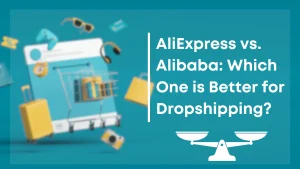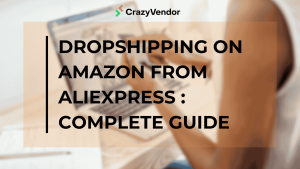Thanks to dropshipping, print-on-demand, and digital products, building an online store without inventory has never been easier. You don’t need to rent a warehouse or invest thousands in bulk stock. Instead, you can run a full eCommerce store with minimal upfront costs and zero fulfillment stress.
This guide will walk you through the steps, from picking a business model to scaling your store with advanced marketing and automation.
Choose the best model for your inventory-free store
There are multiple ways to run a profitable online store without inventory. Each model has its pros and works best for specific types of sellers.
Dropshipping and Print-on-Demand
Dropshipping allows you to sell physical products that a supplier ships on your behalf. Print-on-demand takes it a step further by letting you offer custom-designed goods like shirts, mugs, and posters without managing stock. You simply upload your artwork, and the supplier prints and ships when someone orders.
📌 Tip: Start with platforms like Printify or superDS that offer automation for product syncing and order processing.

Digital Products and Affiliate Marketing
Selling digital products—like eBooks, templates, or online courses—requires no shipping at all. You create the product once and sell it unlimited times. Affiliate marketing, on the other hand, lets you earn a commission by promoting other people’s products.

Set up your online store without inventory using the right tools
To make your online store without inventory look and run like a pro, you need the right tools from the start. Your eCommerce platform should be easy to use, flexible, and reliable. And when it comes to simplifying backend tasks like order flow and inventory tracking, tools like CrazyVendor offer powerful automation to streamline your business.
Choosing the Right E-commerce Platform
Shopify, WooCommerce, and BigCommerce are top picks. Choose one based on ease of use, integrations, and pricing. Shopify is great for beginners, while WooCommerce gives you more customization if you’re familiar with WordPress.
📌 Tip: Start with a free trial on Shopify and test your layout before committing.
Store Design and Product Upload
Your store should look professional and work well on desktop and mobile. Use clear product descriptions, customer reviews, and branded visuals.
More on this in CrazyVendor’s guide: 10 Blog Layout Best Practices for 2025
Promote your online store without inventory and attract customers
Even if your online store without inventory is ready, it won’t grow unless people see it. Marketing drives your traffic, and traffic fuels your sales.
Organic Growth Through SEO and Content
SEO helps your store rank on Google. Start by optimizing your homepage, collection titles, and blog content. Write helpful posts answering questions your customers are already searching for.
📌 Tip: Use free tools like Ubersuggest or AnswerThePublic to find keywords your audience wants.
Paid Ads and Social Promotion
Use Facebook, Instagram, and TikTok ads to highlight your bestsellers. Partner with micro-influencers in your niche to build trust and reach.
Explore SuperDS’s insights here: How to Optimize Your eBay Listing for Maximum Sales
According to Oberlo’s success story, one seller scaled a pet-themed POD store to $10,000/month using nothing but Instagram Reels and giveaways. Engagement beats paid ads when done right.
Advanced strategies to grow your online store without inventory
Once your store is making sales, the next step is optimizing for growth. A successful online store without inventory needs to improve in multiple areas—conversion, retention, and efficiency.
Diversify Products and Bundle Offers
Introduce upsell options or bundle deals. Offer themed kits, gift packs, or exclusive sets to increase average order value without spending more on customer acquisition.
Personalize Promotions and Flash Sales
Use customer behavior data to create custom discounts, holiday offers, or email-exclusive deals. Create urgency using limited-time sales or countdown timers.

Build brand loyalty for your online store without inventory
Long-term success in an online store without inventory models comes from building emotional connections, not just selling products.
Create a Memorable Brand Identity
First, your brand voice, colors, and content should all align for a cohesive experience. This consistency helps you stand out and build recognition over time. Moreover, adding a personal story on your About page shows customers who’s behind the brand, creating a deeper emotional connection.
📌 Tip: Use Canva’s free branding kit tool to keep your visual identity consistent across social, email, and web.
Encourage Reviews and Reward Loyalty
Next, follow up after delivery and ask for reviews to build trust and credibility. By offering loyalty points, referral rewards, or early access to new products, you encourage repeat business. As a result, returning customers, who are up to 9x more likely to convert again, will feel valued and engaged.
According to Smile.io’s research, brands with loyalty programs see 2.5x higher customer spend than those without one.

Track performance and stay ahead of trends
You can’t improve what you don’t measure. Tracking data is how your online store without inventory stays agile and competitive.
Use Analytics to Guide Your Decisions
To start, track which products sell best, where users drop off, and what channels convert most effectively. With this information, you can confidently adjust your ads, content, and site layout to better meet customer needs. As a result, your store will operate based on clear insights rather than guesswork.
📌 Tool to use: Google Analytics for traffic + Hotjar for heatmaps and session recordings.
Stay Current With E-Commerce Shifts
In addition, remember that from AI-powered product recommendations to voice search, eCommerce keeps evolving rapidly. By staying ahead through reading blogs, joining communities, and watching competitors, you’ll remain informed and adaptable. Consequently, this proactive approach helps you spot emerging opportunities before others do.
📌 Resource: Join the r/dropship or Shopify Entrepreneurs group on Reddit for live trend discussions and free feedback.
Here are some other success tips:
- Begin small: Avoid offering too many items or services at initially. Begin with a minimal assortment and concentrate on developing a solid consumer base.
- Provide exceptional customer service: Your most important asset is your customers. Make sure you give outstanding customer service so they will return for more.
- Be patient: creating a successful internet shop takes time. Don’t be disheartened if you don’t get results right away. Continue to work hard and you will ultimately reach your objectives.
Creating an internet store may be a fulfilling experience. You can develop a profitable business with the appropriate strategy and execution.
Conclusion
Running an online store without inventory is one of the smartest ways to start an eCommerce business today. With zero stock risk and flexible fulfillment options, it opens the door to beginners and experienced sellers alike.
Choose your model, vet your suppliers, and use smart tools to launch fast. Then focus on branding, customer retention, and automation to scale. Your store can grow fast, as long as you stay consistent, test new ideas, and stay connected with your customers.
You don’t need a warehouse to start a business. You just need a smart plan—and now you’ve got one.





